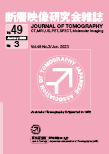Computed tomography imaging characteristics of thymoma:
Comparison with and without myasthenia gravis
Hiroyuki Yasui, MD, PhD1),Soma Kumasaka, MD, PhD1),
Natsuko Kawatani, MD, PhD2),Makoto Shibata, MD, PhD3),Yuka Kumasaka, MD, PhD1),
Natsumi Katsumata, MD, PhD1),Yoshito Tsushima, MD, PhD1)
1)Department of Diagnostic Radiology and Nuclear Medicine,
Gunma University Graduate School of Medicine
2)Division of General Thoracic Surgery,
Integrative Center of General Surgery, Gunma University Hospital
3)Department of Neurology, Gunma University Graduate School of Medicine
Abstract
Background: Thymoma is the most common primary neoplasm of the anterior mediastinum. Up to 50% of patients with thymoma have been reported to have myasthenia gravis (MG), which can be life-threatening. Although some imaging features of thymoma have been reported, data regarding the characteristics of thymoma-associated MG are limited.
Purpose: To determine the computed tomography (CT) imaging characteristics of thymoma through a comparison of patients with and without MG.
Material and Methods: We retrospectively analyzed patients with thymoma (n = 67) who underwent both unenhanced and contrast-enhanced CT before surgery. To compare patients with thymoma with and without MG, we evaluated patients’ characteristics and CT features such as tumor shape, tumor edge, presence of calcification, cystic degeneration or necrosis, invasion of mediastinum or lung tissue, longest diameter of the tumor, attenuation value on unenhanced CT, and tumor contrast enhancement (which is calculated by the difference of CT attenuation values before and after contrast enhancement).
Results: Patients with MG showed lower tumor contrast enhancement (29.8 ± 12.2 vs. 45.9 ± 26.3 Hounsfield units, p = 0.013) compared with patients without MG. No statistical differences were observed in any other factors.
Conclusion: Thymoma with MG was associated with lower tumor contrast enhancement compared with thymoma without MG.
Key words :
thymoma, myasthenia gravis, computed tomography (CT), tumor contrast enhancement
|

![]() 会員の方は会員専用ページ内学会誌(全文)をご覧ください。
会員の方は会員専用ページ内学会誌(全文)をご覧ください。